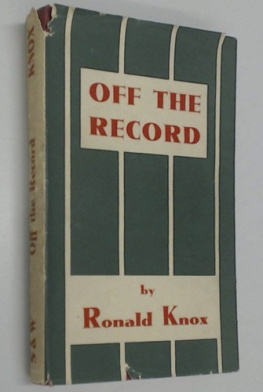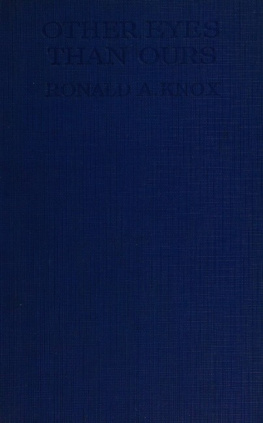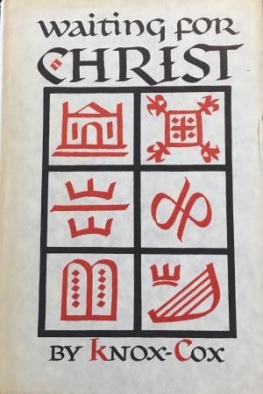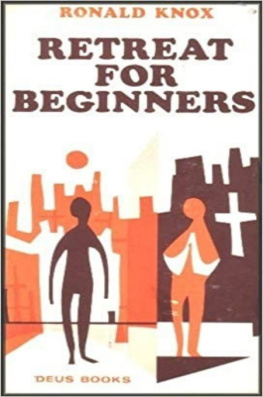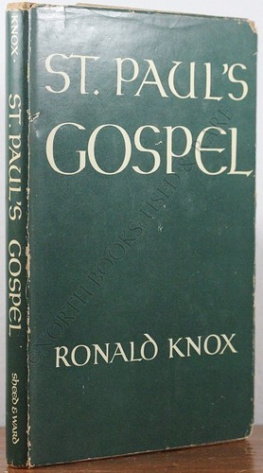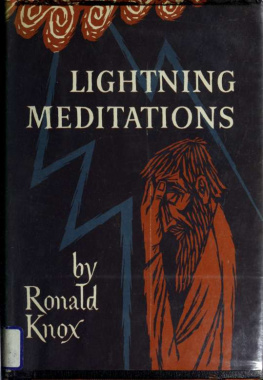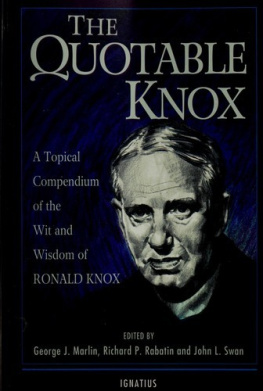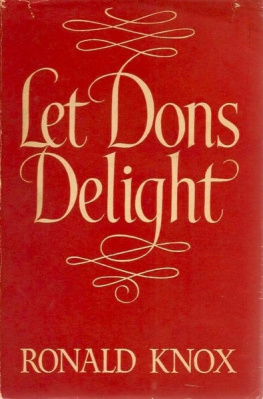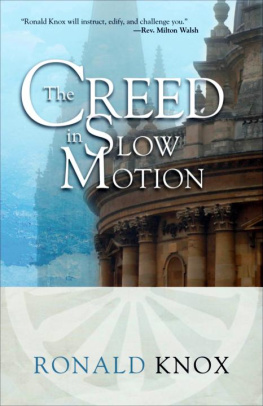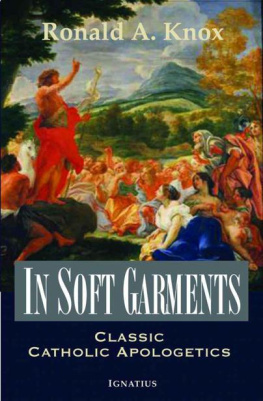Ronald A. Knox - Off the Record
Here you can read online Ronald A. Knox - Off the Record full text of the book (entire story) in english for free. Download pdf and epub, get meaning, cover and reviews about this ebook. year: 0, genre: Religion. Description of the work, (preface) as well as reviews are available. Best literature library LitArk.com created for fans of good reading and offers a wide selection of genres:
Romance novel
Science fiction
Adventure
Detective
Science
History
Home and family
Prose
Art
Politics
Computer
Non-fiction
Religion
Business
Children
Humor
Choose a favorite category and find really read worthwhile books. Enjoy immersion in the world of imagination, feel the emotions of the characters or learn something new for yourself, make an fascinating discovery.
- Book:Off the Record
- Author:
- Genre:
- Year:0
- Rating:3 / 5
- Favourites:Add to favourites
- Your mark:
- 60
- 1
- 2
- 3
- 4
- 5
Off the Record: summary, description and annotation
We offer to read an annotation, description, summary or preface (depends on what the author of the book "Off the Record" wrote himself). If you haven't found the necessary information about the book — write in the comments, we will try to find it.
Off the Record — read online for free the complete book (whole text) full work
Below is the text of the book, divided by pages. System saving the place of the last page read, allows you to conveniently read the book "Off the Record" online for free, without having to search again every time where you left off. Put a bookmark, and you can go to the page where you finished reading at any time.
Font size:
Interval:
Bookmark:

Knox, Ronald Arbuthnott, 1888-1957
This book was produced in EPUB format by the Internet Archive.
The book pages were scanned and converted to EPUB format automatically. This process relies on optical character recognition, and is somewhat susceptible to errors. The book may not offer the correct reading sequence, and there may be weird characters, non-words, and incorrect guesses at structure. Some page numbers and headers or footers may remain from the scanned page. The process which identifies images might have found stray marks on the page which are not actually images from the book. The hidden page numbering which may be available to your ereader corresponds to the numbered pages in the print edition, but is not an exact match; page numbers will increment at the same rate as the corresponding print edition, but we may have started numbering before the print book's visible page numbers. The Internet Archive is working to improve the scanning process and resulting books, but in the meantime, we hope that this book will be useful to you.
The Internet Archive was founded in 1996 to build an Internet library and to promote universal access to all knowledge. The Archive's purposes include offering permanent access for researchers, historians, scholars, people with disabilities, and the general public to historical collections that exist in digital format. The Internet Archive includes texts, audio, moving images, and software as well as archived web pages, and provides specialized services for information access for the blind and other persons with disabilities.
Created with abbyy2epub (v.1.7.6)
OFF THE RECORD
BY RONALD KNOX
O
SHEED AND WARD
NEW YORK 1954
NIHIL OBSTAT: EDUARDUS MAHONEY, S.T.D. CENSOR DEPUTATUS
imprimatur: [ eduardus myers
ARCHIEPISCOPUS BEROEENSlS ET COADIUTOR WESTMONASTERIENSIS
WESTMONASTERII, DIE IOA AUGUSTI, 1953
COPYRIGHT, 1954, BY SHEED AND WARD, INC. LIBRARY OF CONGRESS CATALOG CARD NUMBER: 54-6138 MANUFACTURED IN THE UNITED STATES OF AMERICA
One of the commonest excuses we plead for the neglect of our correspondence is that we cannot remember So-and-sos initials, that we have lost his address, or that he might be offended if we put the wrong letters after his namewe must wait till the opportunity arises for checking up on these important details. Conversely, for that strange portion of mankind which writes letters with alacrity, the mere sight of a mans name and initials in cold printin a newspaper, on a hoardingis an invitation to write to him. And those of us whose names are apt to appear in this way are familiar with the silting up of correspondence from strangers which is the result of it. The faddists, the fanatics, the lunaticsthey are a matter of course; so are the kind old ladies who urge you to make your peace with God. But there are other communications less easily answered; from people who have forgotten the name of a book, or cannot find the source of a quotationyou, of course, will know; the very man! Questions which might more reasonably have been addressed to a second-hand bookseller, to a scholastic agency, or to a Church newspaper take their toll of ones leisure and ones patience. Well, why not?
But among those unfamiliar handwritings we knit our brows over at breakfast-timePaignton? Do I
know anybody at Paignton?some are those of genuine enquirers. People, I mean, who have come across some theological difficulty which threatens to cloud their convictions and disturb their composure of mind; they dont know anybody who would be able to help them, or perhaps the subject is one they would sooner discuss through the post and with a stranger. Sometimes they begin with a pathetic rigmarole of self-introduction, You wouldnt remember, but you did once meet a cousin of mine when you were lecturing at Harrogate; sometimes they simply throw themselves on your good nature. Is it good nature, or shame at being so ill-natured, or just the desire to show off, that makes you sit down and write that thousandword letter, just when you have told an editor you are too busy to turn round? In my case, as often as not, the questions I am called upon to solve are those of people who are finding their way, but with difficulty, into the Church; and the memory of a laceration you have experienced is calculated to arouse pity. All the same, was it worth while to spread yourself like that for the benefit of one correspondent you will never hear of again? If you had humoured the editor, what you wrote would have met many eyes, touched, perhaps, many hearts.... Occasionally, with this in mind, I have had the forethought to slip a carbon sheet into my typewriter; why not have the document on record? For one thing, there is an advantage in being able to quote what you actually did say, in the event of being taxed with some misquotation of it. And, I confess, I had it at the back of my mind that if any
vi
body wanted to put together some memoir of me when I am dead, it would be convenient for them to find the stuff lying about in a drawer. Anyhow, there was no harm done; carbon paper is cheap.
As I say, I only did this occasionally, and on no principle. But the other day, when I was searching for some document in an old drawer, a temptation came over me. Quite a number of these typewritten sheets confronted me; many of them faded, after the depressing fashion of typewriter ink. By some trick of the imagination, a faded piece of typescript always gives you the feeling that the thing writteneven if you wrote it yourselfis dated. The style belongs to your bad period; the colloquialisms are of yesterday. Was it not an excess of piety to bequeath these documents, faded as they were and destined to fade yet more dismally, to a biographer who had only an imaginary existence? Why not yield them up now, a trifle shopsoiled but still readable, as a sop to my publisher? And I tidied out the drawer.
Not without some hesitations, I admit; was there not, here, some violation of confidence? In law, to be sure, my position was unassailable; in law, I understand, the piece of paper which you transmit to your correspondent belongs to him, but the copyright of what you have set down remains in your possession. My carbon sheets had never left the paternal roof; they were mine, and the copyright went with them. But had not the addressees some right to be consulted? I consulted three or four of them, with whom I was still in contact, and all agreed that there was no harm in publishing my
vii
letters, for the benefit of other would-be enquirers whom the same scruples might have assailed. I hope that I may take these two or three as representative of some three dozen others, whose addresses are lost to me. Every care has been taken to obliterate not only the names of my correspondents but any allusions which would make identification possible. Every mans case is an A.B. case, and as A. or B. I hope they will not mind recognizing themselves, if they do still recognize themselves, in print.
Beyond obliterating these personal landmarks, I have not done much to alter the text of the letters as it stood. Thank you for your letter has been cut out, and Yours sincerelypieces of realism which grow wearisome by repetition. A few phrases which might pass muster in a private communication, but would be frowned upon as flippant or ill-considered in a published document, have gone the same way. A few quotations have been filled in, a few ambiguous allusions expanded. But for the most part the letters stand as I wrote them. 'Even when we are writing to strangers we get some glimpse of their quality, of their atmosphere. And if the reader finds himself, now and again, protesting that this is not the sort of letter he would like to get, let him remember that he was not the person who got it.
Next pageFont size:
Interval:
Bookmark:
Similar books «Off the Record»
Look at similar books to Off the Record. We have selected literature similar in name and meaning in the hope of providing readers with more options to find new, interesting, not yet read works.
Discussion, reviews of the book Off the Record and just readers' own opinions. Leave your comments, write what you think about the work, its meaning or the main characters. Specify what exactly you liked and what you didn't like, and why you think so.

